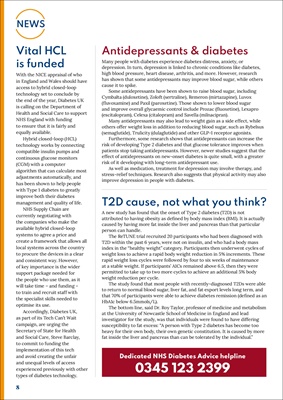
8
NEWS
Dedicated NHS Diabetes Advice helpline
0345 123 2399
Vital HCL
is funded
With the NICE appraisal of who
in England and Wales should have
access to hybrid closed-loop
technology set to conclude by
the end of the year, Diabetes UK
is calling on the Department of
Health and Social Care to support
NHS England with funding
to ensure that it is fairly and
equally available.
Hybrid closed-loop (HCL)
technology works by connecting
compatible insulin pumps and
continuous glucose monitors
(CGM) with a computer
algorithm that can calculate most
adjustments automatically, and
has been shown to help people
with Type 1 diabetes to greatly
improve both their diabetes
management and quality of life.
NHS Supply Chain are
currently negotiating with
the companies who make the
available hybrid closed-loop
systems to agree a price and
create a framework that allows all
local systems across the country
to procure the devices in a clear
and consistent way. However,
of key importance is the wider
support package needed for
the people who use them, as it
will take time - and funding -
to train and recruit staff with
the specialist skills needed to
optimise its use.
Accordingly, Diabetes UK,
as part of its Tech Can't Wait
campaign, are urging the
Secretary of State for Health
and Social Care, Steve Barclay,
to commit to funding the
implementation of this tech
and avoid creating the unfair
and unequal levels of access
experienced previously with other
types of diabetes technology.
Antidepressants & diabetes
Many people with diabetes experience diabetes distress, anxiety, or
depression. In turn, depression is linked to chronic conditions like diabetes,
high blood pressure, heart disease, arthritis, and more. However, research
has shown that some antidepressants may improve blood sugar, while others
cause it to spike.
Some antidepressants have been shown to raise blood sugar, including
Cymbalta (duloxetine), Zoloft (sertraline), Remeron (mirtazapine), Luvox
(fluvoxamine) and Paxil (paroxetine). Those shown to lower blood sugar
and improve overall glycaemic control include Prozac (fluoxetine), Lexapro
(escitalopram), Celexa (citalopram) and Savella (milnacipran).
Many antidepressants may also lead to weight gain as a side effect, while
others offer weight loss in addition to reducing blood sugar, such as Rybelsus
(semaglutide), Trulicity (dulaglutide) and other GLP-1 receptor agonists.
Furthermore, some research shows that antidepressants can increase the
risk of developing Type 2 diabetes and that glucose tolerance improves when
patients stop taking antidepressants. However, newer studies suggest that the
effect of antidepressants on new-onset diabetes is quite small, with a greater
risk of it developing with long-term antidepressant use.
As well as medication, treatment for depression may involve therapy, and
stress-relief techniques. Research also suggests that physical activity may also
improve depression in people with diabetes.
T2D cause, not what you think?
A new study has found that the onset of Type 2 diabetes (T2D) is not
attributed to having obesity as defined by body mass index (BMI). It is actually
caused by having more fat inside the liver and pancreas than that particular
person can handle.
The ReTUNE trial recruited 20 participants who had been diagnosed with
T2D within the past 6 years, were not on insulin, and who had a body mass
index in the "healthy weight" category. Participants then underwent cycles of
weight loss to achieve a rapid body weight reduction in 5% increments. These
rapid weight loss cycles were followed by four to six weeks of maintenance
at a stable weight. If participants' A1Cs remained above 6.5, then they were
permitted to take up to two more cycles to achieve an additional 5% body
weight reduction per cycle.
The study found that most people with recently-diagnosed T2Ds were able
to return to normal blood sugar, liver fat, and fat export levels long term, and
that 70% of participants were able to achieve diabetes remission (defined as an
HbA1c below 6.5mmols/L).
The bottom line, said Dr. Roy Taylor, professor of medicine and metabolism
at the University of Newcastle School of Medicine in England and lead
investigator for the study, was that individuals were found to have differing
susceptibility to fat excess: "A person with Type 2 diabetes has become too
heavy for their own body, their own genetic constitution. It is caused by more
fat inside the liver and pancreas than can be tolerated by the individual."